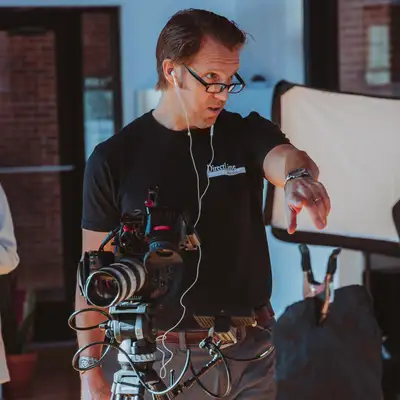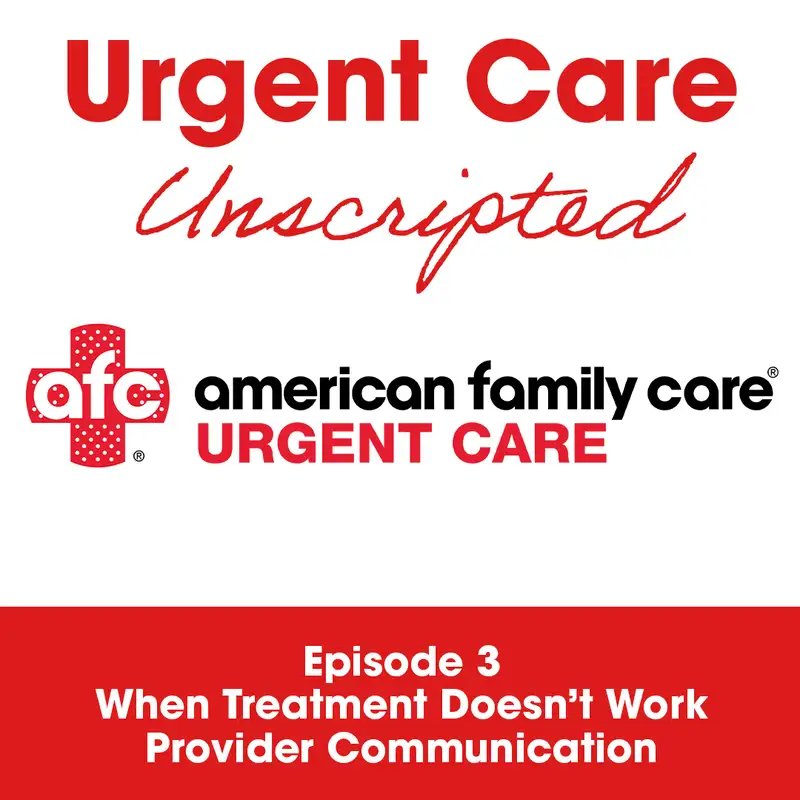Urgent Care Unscripted: Episode 3 - When Treatment Doesn’t Work – Provider Communication
Welcome back to Urgent Care Unscripted.
I am Barbara Brant. Alter.
And this is Mohamed Salah.
And we also have, our,
medical director, Felix Pacheco,
with us.
today we will be talking about,
we started talking about
many different healthcare topics,
but today's focus is on
when treatments don't work
and how communication plays
a big role in the way forward.
And, thank you for joining us.
Yeah.
Thank you, Doctor Felix.
Thank you. Happy to be here.
So, we'll start with,
a couple things
that are important to patients.
And I think it's a big topic
for urgent care world
is what happens
when the treatment doesn't work.
So some things to consider are, you know,
whether or not
obviously the diagnosis was correct.
There's some
so that may be correct. But the illness,
sometimes suffers a complication.
And a good example is like from media,
you know, if you develop new symptoms,
you know, maybe it's not the same illness,
but rather the complication
of the previous illness. Yeah.
Another thing to, take into consideration
is that providers often consider a disease
process in terms of a time frame.
It's something that takes longer,
you know, not the same.
And depending on your,
like risk factors, age and whatnot,
those have to, you know,
be taken into consideration as well.
Another thing to consider is
whether or not the treatment was correct.
You know, sometimes, either
the treatment was,
incorrect for you, meaning
that it could have been treatment for you
because of antibiotic resistance,
for instance.
Or I think,
towards tolerance to the medication,
but sometimes, you know, adherence
or in adherence to the medication regimen,
you know, so
these are all things to consider also.
And, Doctor Felix,
when it is still not working,
it's great to know from,
many different perspectives of why
it's not working, but what kind of patient
do in that situation.
So for all the reasons mentioned before,
a provider needs to know
that this happened may because,
a treatment failure or incorrect diagnosis
cannot be something that will determine
if we do not know about it.
So, for communication with the provider
to ensure
that your symptoms are,
you know, resolving or worrying.
So. Got it.
And if it's, if it's a viral infection,
does that is that any different way
that the patient should be addressing
or approaching it versus a bacterial.
Can you tell us more about, between us
versus viral situations?
So most of is, is do not require,
any specific treatment.
Obviously there are some exceptions.
You know, Covid is,
one that was very prominent recently.
You know, influenza or the flu, might be,
something in which treatment as well,
or depending on your risk factors.
Right.
Now, because there's an overlap
in presentations,
bacterial illnesses
and by organisms may present the same.
And that's the point of seeing a provider
to hopefully make the right determination
whether that access actually is needed
to make sure there's no pneumonia or,
maybe some other testing
that we have available at the clinic,
for instance, like Covid testing
or flu testing that
we can easily evaluate for,
and potentially rule out.
And if it's something positive,
whether or not treatment is necessary,
that's great.
Can you tell us a little bit about
since you mentioned viral infections,
versus let's say bacterial infection,
can you tell us why?
A lot of the times providers are reluctant
to prescribe antibiotics.
So a couple of reasons.
The most common,
which is the lack of a benefit of,
treating a viral illness with
an antibiotic that targets the bacteria.
So it would be inappropriate management.
And because of that,
you can have, you know, some people
who don't tolerate antibiotics.
Well, another key I distress,
maybe some diarrhea,
disrupting the gut microbiome.
Additionally,
there's a possibility of adverse effects,
like an allergic reaction. Right.
And then in terms of long term
exercise complications,
increased prevalence
of antibiotic status,
meaning that bacteria
evolve to, tolerate these antibiotics.
So you want to preserve them
as best as possible, because diets
maybe antibiotics in the,
in the pipeline for, you know, future use.
With that being said, at what point?
Because I think a lot of patients come in,
they get diagnosed with a viral infection,
and then they come back,
you know, a week later,
I'm not still feeling better.
And then they do get prescribed
by antibiotic at that point.
Why why is that?
A couple of reasons.
There's always the possibility
that the initial diagnosis is incorrect.
There's also the possibility
that you had a, post-viral complication
in which you actually developed
a bacterial infection after
an infection could by infection,
can sometimes be at risk.
So thanks to, this is such that,
it makes me more dead at that point.
But, underlying all this,
you know, communication is key.
You know,
if you're not, recovering as expected,
then you should have the evaluation
and communication with the provider.
A potential GP visit.
To the clinic in order to ensure
that you're actually getting better
or that new treatment is, given,
if needed, here, if the urgent care
and what's even we do
next day
follow up calls, we do understand that
you're not going to get better
within that next day,
but it's important for us
to let the patients know at that point.
We do have this line of communication
open with you.
We want to make sure you picked up your
prescriptions or if you had any questions
at the visit that you were not able to ask
or didn't get an answer on.
We can answer that question.
At that certain point.
I also want to mention, with that
being said, is
coming in for a follow up if you're still
feeling not feeling better.
Sometimes we might ask you to come in
for a follow up.
We do have an x ray tech on site,
so it might be necessary
for the provider to diagnose
you and get that chest x ray or whatever.
Or another point of care testing
or just repeat testing.
So it's really important
that we communicate with the patients
and let them know that those are options
for them.
Yeah.
Just to keep that for our patients
in mind, that a follow up
call to ask for guidance
to inform your provider
where you are in your process of recovery,
that really in most cases
does not cost you anything.
That communication really can take
you much further along
the whole process of recovery versus
you are thinking sitting at home
and not bothering others
could, could be a better choice.
No, it may not be the best choice
in many situations.
So we advise always to stay in touch
with the plan and keep us informed.
And let us know how you're doing.
The the other thing, the, the,
Pacheco that we also see,
is that how does a patient decide, like,
should I really at this point,
we will have down the road
a full episode on this, deciding between
an urgent care visit and your visit,
but they have, some kind of an injury.
It could be
just a cut on their finger,
or it could be an accident or
an accident, or it could be something more
severe than that.
And how can they decide, like,
do I go with this injury?
Do I look good?
I didn't care, do I was but emergency room
or just sit at home
and try to treat it with a Band-Aid?
The first thing is, you know,
very important question trying to decide
between to and you have to consider
the severity of the illness.
Obviously, it's,
in certain cases, and that's probably
not a good place for you to get evaluate,
dealing with a more severe illness.
If there's some confusion
and loss of consciousness,
if there's difficulty breathing
these or, more concerning features
that follow any traumatic injury,
if it's a, you know,
Kid Kingdom playground and has a floor
and is bruised
or, a laceration
that, you know, isn't too deep,
there is an exposure
or an exposure, right?
Those kinds of things,
we can easily, like, treat, you know,
you get cleaning I think on today's
episode, we covered topics.
We covered about, when treatments
don't work, how should it be handled?
We covered about, bacterial disease
versus, viral infections.
We've covered about how follow ups on
and to ear communication is important
in the process of recovery.
We talked about your visit,
versus urgent care visit a little bit.
Appreciate everybody joining in.
And, listening to
and watching our episode.
We will have more,
episodes down the road.
We appreciate you joining and subscribing
to, Urgent Care and scripted and,
and enough to warrant doctor, Pacheco
for helping us out in this, knowledge.
Yeah. Thank you so much, Doctor Pacheco.
And again,
you can find us and Doctor Pacheco here
at 5354 Sawmill Road in West Haven.
Again, a of the urgent care.
And we're here to serve you.
And we'll see you next time.
Creators and Guests




